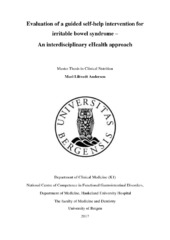| dc.description.abstract | Background: Irritable bowel syndrome (IBS) is the most common functional gastrointestinal disorder, defined by recurrent abdominal pain or discomfort, associated with defecation and/or altered bowel habits. Due to the lack of structural etiology, and curative therapy, these patients have been treated symptomatically. The treatment is recommended to be individualized, where the options are a combination of guidance on diet and lifestyle, pharmacological therapy and psychological interventions. The worldwide prevalence is high and it contributes to reduced quality of life and major healthcare costs. There is a need for treatment that can shorten the waiting line for patient education, reduce healthcare costs and help more people independently of geographic location, therefore an eHealth program was developed and implemented. Aim: The primary aim of the prospective, open pilot study, was to evaluate whether the eHealth program could be effective as a healthcare measure. This was assessed, based on the effect of the program itself, but also in comparison with the effect of the current program; the physical IBS-school at LMS. Design and methods: 52 patients who had got the IBS-diagnosis from either their general practitioner (D93) or by a specialist in gastroenterology (k58), were included in the 6 months long study. They participated in the web-based, interdisciplinary, self-management program. The program was based on 5 different modules with professional content, each compiled by gastroenterologist, physiotherapist, psychiatrist and clinical dietitian. It was implemented in Checkware’s technical platform by Helse Bergen- Section for eHealth. To assess the effect of the program, the participants were asked to complete the six questionnaires; Rome III criteria, IBS-QOL, IBS-SSS, HADS, RAND-36 and NKFM at three time points; at baseline, and after 3- and 6 months, in addition to CSQ-8, at 3 months after the start-up. Control group 1 and 2 consisted of IBS-patients, which participated in the regular, physical, IBS-school at LMS and an extended, physical, IBS-school at LMS, respectively. Results: Of the 52 study participants included in the eHealth program, 40 completed the 3 months evaluation and 31 completed the 6 months evaluation. The analysis of eHealth program (I) followed the participants who completed the 6 months evaluation. 4 out of 5 IBS symptoms significantly improved from baseline to after 3 months, with a mean overall reduction of 64.4 mm (95% CI: 37.6, 91.3 mm, p= 0.00004). 5 out of 8 IBS-QOL subscale scores increased significantly between the latter two time points, with a mean overall improvement of 9.2 (95% CI: 4.2, 14.1, p= 0.001). In control group 1, mean overall IBS symptoms and mean IBS-QOL overall, numerically improved from baseline to after 3 months, with 7.0 (95% CI: -21.8, 35.8, p= 0.617) and 3.9 (95% CI: -7.5, 15.3, p= 0.485), respectively. In the eHealth program (I), 3 out of 5 IBS symptoms significantly improved from baseline to after 6 months, with a mean overall reduction of 78.7 (95% CI: 37.4, 120.0, p= 0.001). 7 out of 8 IBS-QOL subscale scores improved significantly between the latter time points, with a mean overall improvement of 10.1 (95% CI: 5.9, 14.3, p= 0.00003). In control group 2, the overall IBS symptom scores numerically decreased from baseline to after 6 months, with a mean of 32.3 (95% CI: -5.6, 70.2, p= 0.094). Conclusion: In this prospective, open pilot study, we found statistically significant improvement in IBS symptoms and health-related quality of life, according to IBS-QOL. There was also a greater mean improvement in symptoms- and IBS-QOL scores when compared with the control groups, but neither of the scores in the control groups were statistically significant changed. However, it indicates that the eHealth program is not less effective than the IBS-school at LMS. Altogether, it leads us to the conclusion that the eHealth program can be effective as a healthcare measure. | en_US |
